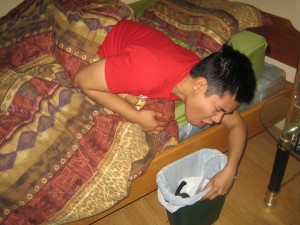Food poisoning is brought on by consuming food that has been contaminated. It is usually not serious, and many people will get better within a few days, and no treatment is needed. Many, food poisoning cases the food has been contaminated by a bacteria. These bacterias include salmonella, Escherichia coli (E. coli), and virus like the norovirus.

Signs & symptoms
Usually the symptoms of food poisoning being in during the first few days after eating the contaminated food. But, they could also start after a few hours or even several weeks later.
The main symptoms of food poisoning will pass in a few days, and can include:
-feeling nauseous
-vomiting
-diarrhea, that could contain mucus or blood
–stomach cramps or abdominal pain
-lack of energy or weakness
-loss of appetite
-fever
-achy muscles
-chills
What To Do?
Many people are able to recover from food poisoning at home, and will not need any other specific treatment. But there are some instances where you should see your General Practioner for advice. (See Below)
Until you start to feel better, you should stay hydrated by drinking lots of fluids while also getting a large amount of rest. This includes drinking plenty of water or try oral rehydration solutions (ORS). ORS can be found at pharmacies and are usually recommended for more vulnerable people, such as the elderly or those with other health conditions. You should also eat, but only when you feel up to it. These meals should be small, light meals that are made up of bland foods, like toast, crackers, and rice.
When to see a General Practioner (GP)
You should contact GP if the following situations occur:
-Severe symptoms: For example, if you are unable to keep any fluids down due to constant vomiting.
-Symptoms do not improve after a few days
-If your symptoms include severe dehydration, confusion, rapid heartbeat, sunken eyes, or passing little to no urine.
-Over 60
-Pregnant
-If you think your baby or young child has food poisoning.
-Any long-term underlying condition, which can include inflammatory bowel disease (IBD), heart valve disease, diabetes, or kidney disease.
-Weak immune system, which can be due to medications, cancer treatments or HIV
How Does Food Become Contaminated?
Food is able to become contaminated at any stage of production, processing, and even cooking. Some examples of how food can be contaminated includes:
-food not being cooked thoroughly, particularly meat
-not correctly storing food, especially if it needs to chilled bellow 5C
-leaving cooked food out for too long
-failing to reheat cooked food properly
-touching food when ill or who has dirty hands
-eating food that has passed the ‘use by’ date
Foods that are highly susceptible to contamination if not stored, handled, or cooked properly can include:
-raw meat or poultry
-raw eggs
-raw shellfish
-unpasteurized milk
-‘ready to eat’ foods like sliced meats, pate, soft cheese or sandwiches
